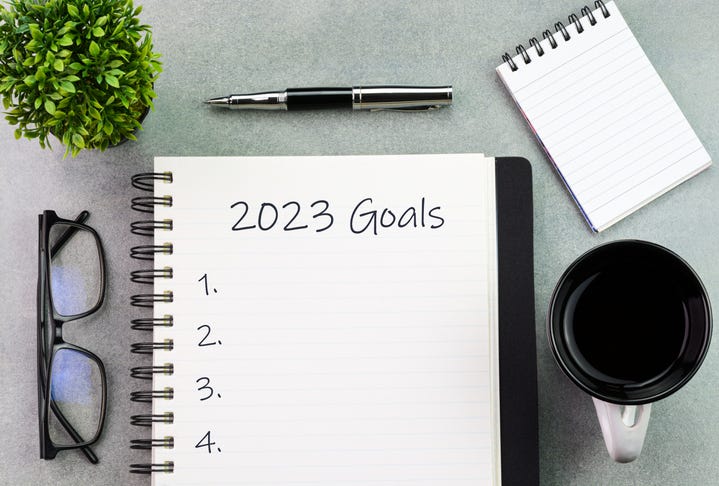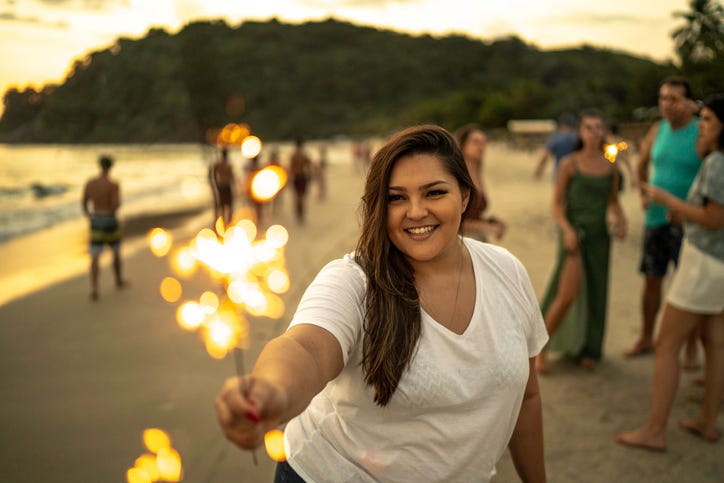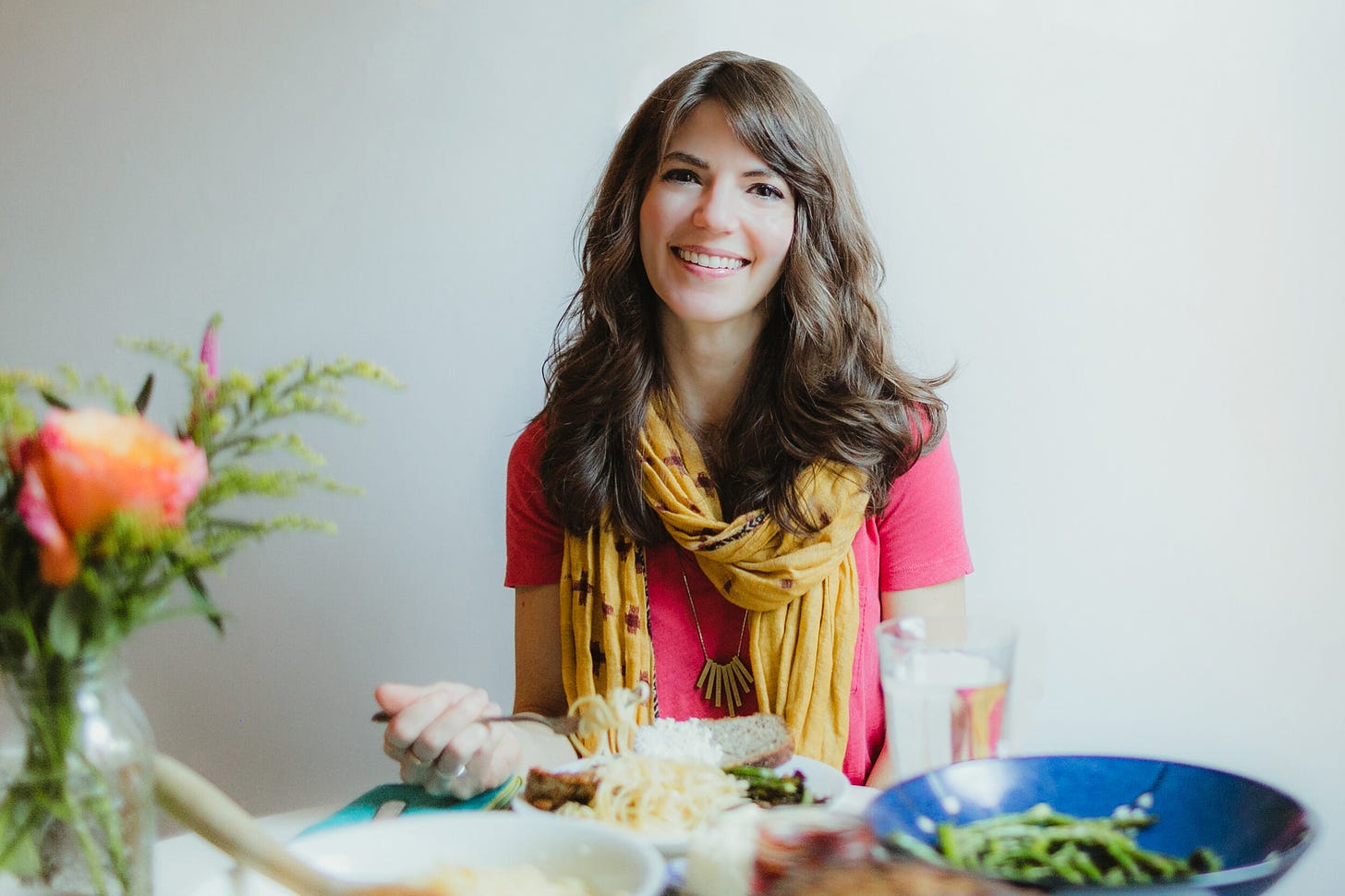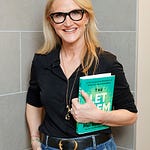You’re listening to Burnt Toast. This is the podcast about diet culture, fatphobia, parenting, and health. I’m Virginia Sole-Smith, I write the Burnt Toast Newsletter. When you hear this, I will—if all goes according to plan—be sitting on a beach in Thailand. Of course, that means I survived the 25 hour flight over and jetlag with my kids. And honestly, those both feel like very open questions as I’m recording this right now.
I know New Year’s is a fraught time for a lot of us. Resolution culture means that diet noise and fitness noise are turned up to level 1000 right now. I was thinking about that and remembered this really lovely conversation that Amy Palanjian and I had with Christy Harrison on our old podcast Comfort Food and I decided that this episode called “New Year, No Diet” would be the perfect rerun to share with all of you this week. It originally aired on January 13, 2019. And wow, the world is different! But diet culture has remained so much the same.
If you aren’t familiar with Christy, she is an anti-diet nutritionist, a journalist, and host of the beloved Food Psych podcast. She’s also the author of the book Anti-Diet, and her new book, The Wellness Trap: Break Free from Diet Culture, Disinformation, and Dubious Diagnoses and Find Your True Well-Being comes out the same day as Fat Talk. So we will be celebrating book birthdays together in April and I’m hoping Christy will be back on the podcast in real time then to talk to us about the new book.
Christy is one of the most thoughtful journalists I know. She is truly a calm and reassuring voice in the anti-diet space. So if you are struggling with any version of the New Year’s bullshit right now, I think you’re going to find this conversation really grounding and helpful. And Burnt Toast will be back next week in your inboxes with an essay on Tuesday, January 10 and in your podcast feeds with an episode with the great Aubrey Gordon on Thursday, January 12. Subscribe now to make sure you don’t miss any of it!
Episode 75 Transcript
Amy
Happy New Year, guys! It’s 2019 which kind of blows my mind and this is our first episode of the new year. So you’re probably surrounded with a lot of diet talk this week, if not for the past few weeks already. People starting new year’s resolutions, detoxes, new wellness plans, everything flooding your your email box and your social media feeds. So, we are here to help you withstand that onslaught and make this year the year you actually feel good about yourself and your food, no matter what you’re eating.
Virginia
I’m Virginia Sole-Smith, I’m a writer, a contributing editor to Parents Magazine and author of The Eating Instinct: Food Culture, Body Image, and Guilt in America. I write about how women relate to food and our bodies in a culture that gives us so many unrealistic expectations about both those things.
Amy
And I’m Amy Palanjian, a writer, recipe developer and creator of Yummy Toddler Food and Yummy Family Food. I’m a contributor to Allrecipes magazine and I love helping parents relax in the daily challenge of feeding their kids.
Virginia
And today we have a very special guest! Joining us is Christy Harrison, an anti-diet dietitian, host of the amazing Food Psych podcast and the lead character in chapter two of The Eating Instinct. Christy, welcome! Thank you for being here.
Christy
Thank you so much for having me.
Virginia
Why don’t you tell us a little more about you for our listeners who might not have encountered your amazing work yet?
Christy
Absolutely. I’m a registered dietician, nutritionist, certified Intuitive Eating counselor and the host of Food Psych podcast, as you said. And I am also the author of a forthcoming book called Anti-Diet: Reclaim Your Time, Money, Well-Being, and Happiness Through Intuitive Eating which will be out late 2019, in time for the New Year and holiday season of the coming year.
Virginia
Excellent. Can’t wait.
Amy
We’re so excited to have you with us today because this the start of the new year always feels like such a vulnerable place for so many people. It’s strange because most of us know that resolutions don’t really stick around and yet there’s all of this pressure for us to do it. Can you talk about like why we all get pulled into this?
Christy
Absolutely. I think the reason we all get pulled into this is what a lot of people call diet culture, which is a system of beliefs that really privileges smaller bodies and stigmatizes larger ones. It elevates some foods while demonizing others, and promotes weight loss as a means of attaining higher status and moral virtue and oppresses people who don’t fit those molds, the cultural ideal of thinness or the cultural ideal of what “health” is supposed to look like.
So that’s a lot to unpack there. But basically, this system of beliefs is with us all year round, 24/7/365. It’s present in the media, of course, and that’s what often gets the most attention, like the photoshopped, airbrushed images of impossibly thin models. But equally important is the diet industry, or what’s now known as the wellness industry, which Virginia, you write about really, profoundly in your book. The wellness industry has become the new guise of the diet industry in the 21st century. So we have still the traditional diet industry and now the wellness industry, too.
We also have the everyday cultural manifestations of this belief system, which can take the form of a parent making a negative comment about their child’s body size or kids teasing each other for their body size on the playground or your coworker making some comment, like, “Oh, are you going to eat that? That has gluten in it. That’s terrible for you.” You know, all these tiny little manifestations. A friend of mine was telling me that the TV show Peppa Pig has a bunch of fatphobia in it.
Amy
Really?
Virginia
It breaks my heart because my daughter loves Peppa Pig, but they shame Daddy Pig a lot for food stuff. It’s a hard one for me.
Christy
It’s everywhere. It’s in these cute cartoons that our kids watch and stuff. It’s really ubiquitous. Diet culture is particularly prevalent in the new year, because it’s become the season where the diet industry does its big push to sell you things. The idea of New Year and renewal, I think, lends itself to this concept that now you’ve just come through the holidays you’ve been eating and “indulging” so much that now it’s time to buckle down and really shrink your body and make a resolution to to change this year.
It dovetails nicely with the fact that we know that diets don’t actually work long term. And by diets, I really mean everything from traditional Jenny Craig, Weightwatchers—although now they’re calling themselves WW for wellness. Everything from that to Whole30, paleo, keto, the things that hold themselves up as just an eating plan, or a “template” or a “protocol” or a “reset.” They use all these different words. They say they’re not diets, but they actually still fall under the umbrella of diet culture, they actually still are diets by another name.
So this time of year, it’s their time for their big sales push, their time to get more clients on board. And those things don’t actually work long term. So we know, the research really shows that any sort of diet, whether it’s wellness or a traditional diet, the weight loss effects certainly don’t last beyond about the 3-5 year mark. That is when we see the vast majority of people have put back on all the weight that they lost. And oftentimes, up to two thirds of the time, people end up regaining more weight than they lost. So intentional weight loss—whatever brand, whatever sort of plan you’re using—doesn’t actually have long term effects. It results in weight cycling in the long run.

Amy
I find it so interesting to think about that marketing piece.
Virginia
Yeah, because we think of the new year as almost like a spiritual time or a tradition. In fact it’s a line item in someone’s business plan, like, “January’s where we do the big push.” It’s not really this organic thing in the calendar, it’s actually very manufactured.
Christy
Yeah, it’s really insidious. It’s like taking this thing that can be so beautiful and spiritual—like cultures around the world have a New Year’s traditions and New Year’s celebrations of some kind.
Virginia
There’s something really lovely about the idea of a fresh start. I’m someone who really enjoys celebrating New Year’s even though I know it’s sort of an arbitrary thing. It just feels like a lovely chance to like set an intention for the year. Something about it is appealing. But that’s interesting that it’s so industry driven.
And just to circle back quickly to the holiday excess thing, because we’re probably all coming off that place. The holidays can be such a fraught time for folks with food. Can you talk a little bit, as a dietitian, why is it normal to “indulge” at the holidays? Why is it not actually like, “Okay, now you’ve got to fix this thing that you just did.”
Christy
It is incredibly normal and part of a balanced and healthy relationship with food to have these holiday moments where you’re enjoying foods that you might not have at other times of the year, that you’re really partaking in these traditions and celebrating with food and connecting over food. Those things have been part of human culture for millennia. Around the world, cultures everywhere have connected over food and had special holiday traditions that involved particular types of food that you don’t necessarily eat the rest of the year, or that you do, but maybe they’re in different configurations or whatever.
It’s very normal to have that experience. Actually, I think it’s really part of a psychologically, mentally healthy relationship with food to have that and to allow yourself to have that and not to feel like you have to be guilty or ashamed or work it off or atone for it in some way.
Intuitive eating is what I practice, as a dietitian, and what I teach. That is really the default mode that kids are all born with. And Virginia, you’ve talked about this with your daughter getting sidetracked from that pretty early in her life. But at first when when babies come out, they’re programmed to seek out food, to tell you when they’re hungry, to stop when they’re full, to be seeking out different flavors and textures to the extent that they’re developmentally able to. Their relationship with food—if left unmarred by diet culture or by other things like medical trauma or food insecurity, or things that can really interfere with people’s relationships with food. If they’re just allowed to maintain that intuitive relationship with food their whole lives, people can be incredibly balanced and not have that fraught relationship with food that causes them to feel like the holidays are just a free for all, you know?
And I experience this now, for myself, as an intuitive eater and with my clients where once you come back around to that intuitive eating that we’re all born with, it’s like, eh, the holidays aren’t a huge deal. Like, it’s great. I love pumpkin pie, I love having my grandma’s or my my aunt’s weird jello salad that she only makes for Thanksgiving. That stuff is awesome. But, other than that, I’m not feeling like I’m eating excessively or restricting leading up to the holiday meal so that I can stuff myself at the at the meal and then feel uncomfortable. It’s not this restrict/binge cycle that it used to be when I was, and when my clients were, really steeped in diet culture. It becomes a much more relaxed, easygoing type of thing. It really can be this celebration, this enjoyment, this opportunity to connect with people over food, without having that extra layer of guilt that diet culture really piles on.
Amy
I always think about when I was a kid—I come from a big Italian American family. And at the holidays, there was a ton of food everywhere. But then, at the same time, we were, for some reason, not supposed to eat it all. There was just this very confusing situation for me. Now, as a parent, I am very aware of if we make a special thing, I want my kids to be able to enjoy it without putting all these restrictions and just confusing the heck out them.
Virginia
Knowing that everyone’s so excited to see this food and simultaneously horrified by it is such a confusing message for kids and for all of us.
Christy
Yeah, it really is. Our culture sends those mixed messages so much, you know? We have so much food advertising and that gets blamed and the food environment gets blamed with the large portion sizes. People say that that’s the cause of so many health conditions and the quote unquote “obesity epidemic” in this country. But research actually shows that people who are intuitive eaters, who have not succumbed to diet culture, who have not been taken away from their body’s natural cues about food and are not fixated on weight can actually make the same choices, the same balanced choices that they would make without those sorts of cues around them. People can be in an environment with abundant food and still honor their hunger and fullness cues, still honor their desires and find satisfaction and pleasure in food and connect with other people over food without feeling like they’ve like gone too far or they have to atone.
Virginia
I’m glad you brought that up because one thing I see also happening in January is when people are in this atone mindset, they often connect whatever plan they’re looking at to health right? They say “it’s not really about weight, I have high blood pressure. I’m not sleeping well.” They’re connecting it to all these health conditions that we link to food and weight. So we’d love for you to talk a little more about why dieting is not the solution if you’re struggling with one of those health problems.
Christy
Yeah, absolutely. It is so common in diet culture, whatever health condition you might have, anything under the sun, is pinned on food. Like, food is the answer. The food is medicine idea is really prevalent in our culture right now. But the problem with that is that diets don’t work longterm. As I mentioned earlier, the statistics show that the vast majority of people end up regaining all the weight that they lost, and also just not being able to stick to whatever diet or plan that they’re on because it really takes them away from the normal relationship with food that keeps people going. And psychologically, being on a diet where you’re restricting certain foods is really taxing. That sort of willpower that people have to exert to change their eating and restrict their eating over the long term just doesn’t hold up because we have an exhaustible supply of willpower. When we’re trying to govern our relationship with food through sheer will, it really doesn’t work. It doesn’t last, it’s not sustainable. Weight cycling, which is the inevitable cycles of of yo-yo dieting that happen because diets don’t work and the vast majority of people gain back all the weight they lost. Oftentimes people are doing these weight cycles again and again, often dozens of times throughout their lives. That’s actually an independent risk factor for things like heart disease, blood sugar abnormalities, all kinds of conditions that tend to get blamed on weight itself. And in fact, there’s research showing that the heart risks, the excess heart risks that are seen in people in larger bodies, can actually all be attributed to weight cycling alone. So not the fact of the larger body, but just to the fact that people in larger bodies are more likely to have dieted more often because of the pressures that they face, in diet culture, to shrink their bodies. And that in and of itself puts their heart at greater risk.
Virginia
That’s pretty mind blowing. So basically dieting to, quote, “improve your health” is going to end up doing the opposite.
Christy
Yep, it’s counterproductive. It’s counterproductive not only for physical health but also for mental health. And we know that mental and physical health are very strongly linked, so that if you’re doing something that negatively affects your mental health, you’re actually affecting your overall health as well. It’s really any sort of diet, any sort of plan or protocol or lifestyle change or whatever you want to call it, is actually creating disorder in your relationship with food. Because an ordered relationship with food, if you will, is intuitive eating. It’s what we’re all born knowing how to do. It’s that ability to seek pleasure and to have some consideration for nutrition, but mostly to follow your hunger and fullness cues. To seek out pleasure, to seek out balance, not to follow diet rules that govern how you eat. Diets take us away from that intuitive relationship with food and create disorder in our relationship with food. They create this sense of having to rely on something external to ourselves to govern our eating instead of knowing and trusting that our bodies will take care of this, that our bodies have got this and that we can really trust ourselves.
So when when we’re taking ourselves away from that intuitive relationship with food, we’re also creating a lot of mental stress and strain that can additionally impact our physical health. And of course, mental health in general is really important to overall happiness. Having mental health be a priority is really important so that you can actually show up for your kids and be there in your life. So many of my clients say—and I know that I went through this too in my own experience with disordered eating—that it really takes away from being able to be present in your life. Your head is so full of calorie counts and macros and Whole30 rules or whatever it may be, that you’re, you’re missing out on the life that’s right here. Whether that’s the mundane stuff, like being able to share a meal with your toddler or the bigger stuff, like being able to get your career going again or have your relationship with your spouse be fulfilling or whatever it may be. There’s so many things in our life that we can miss out on when we’re so fixated on food that it becomes like this full time job or at least an all consuming hobby.
Virginia
So Christy, on our podcast, we have what we call our “mama manifesto” of feed yourself first. Amy and I came up with this because we were talking about how often moms literally don’t feed ourselves first because you’re so busy, like your two year old is like—
Amy
—Screaming
Virginia
—Begging for cheerios and you haven’t even had breakfast yet and you’re throwing food at other people in your house all day long and then neglecting your own hunger and needs. I’m thinking about it in terms of New Years. And I’m wondering what do you think a “feed yourself first” I won’t say diet, but anti-diet, should look like?
Christy
I love that, I love the feed yourself first concept because I think that’s an issue for so many people in our society. I think starting the new year off with an anti-diet is a great resolution to have. I go back and forth on whether I think resolutions are helpful or problematic. This idea of “New Year, New You” can be so problematic because it’s like you’re trying to just turn into a different person or something, and that’s never going to A. be sustainable or B. actually be caring for yourself. It’s not very self-caring to want to erase who you are completely, right? It’s not very self-accepting.
I used to write for Refinery29 and they did a great package a couple years back called “New Year, Do You” which is just all about “you do you.” Like, “new year, take care of yourself.” Deepen your own connection with yourself. So that’s kind of what I would advocate, for a “new year, do you” kind of thing where you’re working to try to really connect more with yourself. Maybe have a resolution to do that. I think an anti-diet approach really fits well there. Instead of making a resolution to try to lose weight or to “get healthy” by cutting out all kinds of different foods or going on the latest plan/template/protocol/lifestyle change, really to think about just getting back in touch with your own body’s needs. Do your best to reject diet culture and reject the diet mentality.
Because research actually shows that when people can reject those Diet Rules and not be governed by them, they’re on a much better path in terms of their physical health or mental health. Their cholesterol levels are lower, their levels, levels of disordered eating are lower. Their self esteem and their mental health are better and all these benefits.
So really, the first step to getting back into that intuitive eating practice is unearthing all of those diet rules and regulations that you’ve been holding on to that you might not even know. They can be so subtle, you know? You don’t have to be on an official diet to still be dieting, you don’t have to be on an official diet to still have the diet mentality and to still be governed by diet rules. Oftentimes, it’s vestiges of diets past or it’s things you’ve picked up from magazines or that your mom said to you when you were a little kid that stuck with you. Like, it’s all these different things that swirl around in our head about food and bodies that make it really hard to have this authentic connection with food and our bodies.
I like to do and recommend a practice to my clients where you journal every day about this stuff. Make a little bit of time, maybe it’s five minutes in the morning or in the evening or when kids are taking a nap or something where you just catalog what’s come up in your head around food and body thoughts in the past 24 hours. Try to think about where that actually comes from, and whether you want to believe it or not, whether it’s something that you’re ready to start to let go of, and what might be an alternative to that kind of thought. So for example, one thing that I see a lot in my clients is that they won’t eat enough during the day. And I think that’s very true with parents in general. You’re taking care of your kid and like you said, you put them first.
Virginia
Your lunch is the leftovers that they don’t eat. The crusts of their sandwich.
Christy
That’s not a satisfying lunch, you know? So by the time dinner rolls around, or evening rolls around, maybe you finally put the kids to bed and you’re just like, I’m ravenous and eat everything in the house. And people often blame themselves for that and think I have no willpower, I have no self control. That’s actually diet mentality talking, that thought shaming you for eating like that is actually the diet mentality saying you’re supposed to be controlling yourself, you’re supposed to be “good.” And actually what it is, is that you didn’t eat enough during the day. You didn’t care for yourself and nourish yourself as you needed. And so of course, your body’s just going to be like, well, let me get it by hook or by crook, like, whatever I have to do to get fed.
A solution to that might be, like you said, feed yourself first. Making sure that you have a plan for how you’re going to feed yourself as well as your children throughout the day. Also maybe having snacks while they’re asleep, while they’re taking naps or whatever. Just as you would probably pack snacks for them when you’re going out, right? To make sure they don’t have a meltdown in the grocery store or whatever. Pack snacks for yourself to make sure that you’re nourishing yourself throughout the day, as well.
Amy
What do you do about all of the noise that we’re hearing on social media and in real life from friends or family members who are talking about their cleanse or their detox, or even like a doctor who might say something unhelpful about your weight. I know at one of the companies I used to work for, there was always this weight loss challenge. And you had to join it in order to get a discount on your health insurance. It was this very convoluted thing. But there are all of those factors that come up in the course of our daily life that can be hard to filter out.
Virginia
You’re surrounded by other people’s diets even if you’re trying to choose a different path.
Christy
I know. That’s why diet culture is so hard and that’s actually why I started talking about it, because I think it’s one thing to be an individual trying to recover and doing your best to get over diets on your own or with the help of a professional. But then if you’re having to go back out into this culture that’s constantly pushing diets in your face, you’ve got your work cut out for you. So I really think it’s kind of a social responsibility as well. It’s not an individual responsibility, really, there’s only so much we can do as individuals. I think we need a huge cultural change.
That being said, there are ways to be resilient to this culture until we have the major cultural shift that we need to have. One thing is having a very liberal delete and block policy or unfollow policy on your social media. I’m all about unsubscribing from the email lists of people who are trying to sell you cleanses, unfollowing the people who are doing Beachbody and trying to get you to be on their team or whatever. Unfollow, unsubscribe, spend some time scrolling through your feeds and see who makes you feel bad about yourself or see who makes you feel like, oh, maybe I should really try that thing that they’re doing. If that comes up for you, just identify that. Notice that as like, okay, that’s a diet culture trigger that I actually don’t need in my life so I’m going to choose to unfollow this person. Even if it’s a good friend! You can actually mute people on Facebook without unfriending them, so they’d never have to know that you unfollowed their news feed or whatever.
Virginia
And if it’s in person, how do you handle? I have to confess to a total fail on this front at my Thanksgiving dinner. Some relatives started estimating the calorie counts in the whole meal. I was so shocked that it came up that I didn’t speak out. I felt afterwards like, oh, my gosh, this is my platform. But I think I was so surprised they brought it up with me in earshot. I was just like, what is happening right now. But I did think afterwards, it’s also very socially awkward. And for people who do this work, you can say, like, “Hey, guys, remember this work that I do?” But for people who are just going through their normal life and this is just something they’re struggling with, how do you advocate for yourself in a group conversation or iwhen all your coworkers are gathered around the water cooler trading these diet tips?

Christy
Yeah, it is really socially awkward. I want to just empathize with that and say, it’s not always going to be easy. You’re not always going to find the right words. You might not always be able to challenge it. And that’s okay! Don’t feel like you have this responsibility to do it every single time because we all have our own stuff going on. Sometimes even I’m like I just don’t have the energy to deal with it.
Virginia
I just can’t do this one.
Christy Harrison
I think it’s a matter of a couple things. One is simply leaving the room, if you can, or leaving the conversation or changing the subject. That’s a little easier to do if it’s a bigger gathering where you can sneak off somewhere and nobody’s going to be like, oh wow, why did she just walk out of this room or whatever. But you can always do that, you have the ability to leave.
You can also set boundaries with people in your life, to the extent that you feel comfortable with them, to the extent that you have a close enough relationship to do that. I find that it’s easier to start with yourself and start with the personal rather than getting into the science or talking about why diets are bad and shaming the other person for being on a diet or something. Putting it on yourself and saying like, “for me, honestly, diet talk is really hurtful and problematic because I’ve had a really hard time with diets. I’ve had really disordered relationship with food over the course of my life. I’m trying to heal from these issues and hearing people talk about diets is really harmful for me right now. I’m just asking if we could please not talk about that. I know that you’re doing your paleo thing and you’re really excited about it. That is great for you, but let’s talk about something else.” So if it’s a close enough friend where you can say something like that, I think that can be really helpful.
If it’s someone that you’re a little less close to, maybe a small seed is the only thing you can do. Saying something like, “diets have never worked for me” or “I’d rather allow myself to eat everything and enjoy myself and I find that it’s a lot a lot healthier for me in the long run to do that,” or whatever. Say something small in the moment that might not totally address the situation, but might at least plant the seed or open the door to a larger conversation.
Know also that the people in your life who are really caught up in diet culture can often be kind of defensive about it. Especially if they’re really on a soapbox about something at the moment. They can be evangelists about it sometimes. And if that’s the case with someone you’re talking to, realize that they’re probably going to be defensive, they’re going to argue with you. It might not be the best conversation. And so that might be a situation where you just say,”I’d like to change the subject, I’m really uncomfortable talking about diets,” or you excuse yourself and leave the room.
Something that I really like, actually, is to someone that you’re close enough to or a family member say “I love you no matter what size your body is or no matter what you’re eating, and there’s so much more about you that I really value then then how you look or the size of your body.” Or like, “tell me about this thing that you enjoy talking about,” you know? “Tell me about how your career is going well,” whatever, like changing the subject to something you know that they’re going to resonate with.
Amy
I was gonna say, the changing the subject approach, which I use on my children when they’re complaining about what’s for dinner, is very effective during dinner parties. A lot of times if you’re sitting around a table, and there’s more than four people, the conversation sort of gets a little bit random anyway. Just toss something else out, it probably won’t seem that awkward to other people. It might just seem like you have something that you really want to talk about.
Virginia
You guys are making me feel better because that’s basically what I did. I felt like I should have made a bigger statement. Just changing the topic can be really helpful.
Christy
Yeah, totally. Sometimes that’s all you can do.
Virginia
Christy, I know, you talked a little bit about your concerns about resolutions in general, which I definitely share. Do you feel like it’s possible for folks to set intentions for the year or say you want to do something like run a marathon or learn to swim or do some new body- or food-related thing that’s not necessarily weight-related? How can you adopt a goal like that for yourself and keep the weight stuff out of it?
Christy
Yeah, it’s really challenging in diet culture to adopt goals like that and not have the weight stuff creep in. It’s just a matter of being in continual dialogue with yourself and taking a critical look at why do I really want to do this. Is it for a sense of a sense of accomplishment? Is it for a sense of something to do that makes me feel really present, like a meditative practice that I enjoy? Is it to prove something to myself? All of those reasons could potentially be valid and something that you want to pursue.
But is there something in there about wanting to change my body? Is there something in there about feeling like I need to be smaller, or I need to be more quote unquote, “toned” or more fit? And what is that about? What is that really about? Am I feeling like the body I’m in right now isn’t good enough? If that’s the case, I would recommend not actually pursuing that goal until the motivation around changing your body goes way down on the list.
In diet culture it’s very hard for it not to be present at all, especially at first when you’re working on changing your relationship with these things. But if you know your motivation for physical activity is 1. to feel good 2. to shrink my body 3. to be more toned, to look better in a bikini, I would say push pause on that activity. Step away and do some work on your relationship with exercise your relationship with your body, your relationship with food, and then see if you can come back to it where maybe those ideas are still in the back of your mind. Maybe it’s like seven or eight down the list of why you want to do this thing, but it’s not the main driving force.
Virginia
That makes a ton of sense.
Christy
I know that in my own relationship with exercise, that was a huge key to healing it. Because, I was—in my disordered eating days—very much an over-exerciser, very much using exercise to punish myself or to try to make up for the binges that I was doing, which were really just due to not eating enough throughout the day. When I was really was focused on trying to heal my relationship with exercise and not be so instrumental and disordered about it, I found that practicing that and saying I’m not going to let myself even do this yoga class if the primary motivation or secondary motivation is Oh, my pants are tight today, I need to get back into the yoga practice. Like, No, I’m going to like spend that time doing some self-development work or just something that makes me feel good that has nothing to do with my body.
Amy
That’s such a smart way to to think about it. I don’t think I’ve ever heard anyone explain it like that, so thank you.
Virginia
Well, it requires a lot of radical honesty with yourself. I’ve definitely done it where I’m like, “no, no, no, I’m sure it’s just that I want to swim across the Hudson River.” Which, it really was in large part that I wanted to show I could swim across the Hudson River. But for sure, number two on the list was I had just had a baby and I was struggling with all of the postpartum body image stuff. It’s tough to sit with that and parse through what is really motivating you, but that’s really smart advice.
Amy
Thank you so much for joining us. This has been really awesome way to start the new year. Can you tell our listeners where they can find you?
Christy
Absolutely. The best way is on my website, Christyharrison.com. From there, you can find pages for the podcast and my writing and other work. You can also just type in Food Psych to whatever podcast provider you’re listening to this on. I produce new episodes every week. And I’m on Instagram and Facebook as well. But you can find that all on my website, Christyharrison.com.
Virginia
For this week’s unrelated, I wanted to talk about the last week of my life where I’ve basically questioned all of the choices that led me to become a parent. Our baby Beatrix, who’s 13 months old, has had a terrible ear infection. I want to be clear right now, I have had a kid with true medical catastrophes. Ear infections are not life or death. They are not a serious medical issue. So please don’t think I’m trying to equate our drama to any serious thing, because it wasn’t. But it’s so aggravating because she was pretty miserable. Dealing with fevers and the snotty nose, and then it went to an ear infection and she hates taking amoxicillin. But the big thing was, she really stopped eating. It was so interesting because of course, again, I’ve had the more severe version of this. But, suddenly my baby who, from birth has been a very food motivated child and just happily eats everything. Solid food went out of the window on day one, she was not interested in breakfast, lunch, or dinner. Like, throwing food off her highchair, just totally refusing.
Amy
Did you know she was sick at that point?
Virginia
We knew she had a really snotty nose but I don’t think she had broken a fever yet. The appetite went away pretty quickly. She’d had a cold for about a week and the snottiness was getting grosser, not less gross. So then last Monday, she just shut down on solid foods. Then by day two, she was rejecting her bottles too. And that’s even scarier, because at first you’re like, solid food, whatever. She’s got formula, it’ll be fine. And then when she started pushing away the bottle—she’d have like an ounce, maybe two ounces and push them away. It just reminded me how nerve wracking it is when your kid won’t eat. And I know she’s been growing very well. I know she’s got reserves—again not a crisis situation. It just really drove home for me how unsettling it is. And it gave me renewed empathy for when parents talk about like, “oh my kid is really not eating,” you really get that right in the in the gut kind of fear about your kid.
Amy
Yeah, we had something similar with Tula who basically had a cold for like a solid month and would occasionally spike a 102 fever and then she’d be fine two hours later. So we had all these days where I’d keep her home from daycare and then by like 10AM, she was like bouncing off the walls
Virginia
Nothing cures a fever like derailing your work day.
Amy
And she’s old enough that I thought, like I kept asking you, “Do your ears hurt? Does your head hurt?” She’s old enough that she can talk really well and she’s pretty eloquent for a two year old, but she didn’t have the words to explain.
Virginia
Yeah, I’ve definitely noticed that even with a pretty verbal kid, they can’t always express pain or where the pain is. It’s hard for them to get that across.
Amy
We had a number of dinners where she just wanted someone to hold her and would just cry. It just isn’t her personality and I was not prepared for it.
Virginia
Yep. This was totally my week.
Amy
And it was like two nights in a row. And I was like, “what’s happened to our child?” And like, “is she ever coming back?”
Virginia
Please can I have her back? I want the nice kid back. This one’s really hard.
So some things I did that did help—because I mean, Beatrix basically did not eat proper meals. I would say on a normal day, she drinks still around 20 ounces of formula, or formula and regular milk, we’re kind of transitioning. And this week, she was like eight or less per day. Sometimes six ounces, so it was a pretty big drop off. But she did still go for water in her sippy cup. So I knew she was staying hydrated, and as long as your baby’s making wet diapers, you don’t have to worry too much about the dehydration. So, she was still drinking water. And then we had some luck with things like popsicles and fruit. She would go for fruit, like strawberries. I think it was cold and a lot of water and I really just didn’t push it very hard one way or the other. Because I think it is important that you can have faith that this is temporary, they’re gonna get their appetite back. I think what can go off the rails in these situations is when parents freak out—again, very understandably—and push too hard on the food. Then, especially with this age group, you’re really at risk for setting up a power struggle that could stay with you long after the illness. You can really get yourself into a bad pattern.
Amy
Yeah, what was it like when she started eating again? Were there any issues with any habits that she’d picked up?
Virginia
The biggest thing that we’re gonna have to reset is holding her during meals because she was so miserable and not eating. She would scream and so I would take her out of the highchair and then basically, just like you said, hold her while she sobbed while I tried to eat my dinner. It was a fun week, you guys. Children are a gift.
But now, even though she does want to eat again—the appetite when it came back was like gangbusters. She’ll sit there, inhale all her food. Then as soon as she’s done, wants to scream, come on my lap and eat off my plate. Because that was the other thing, because I was letting her get in whatever she could, I was letting her eat off my plate, use my fork when she did show some interest in food because we wanted to get a few bites in here and there. And now she thinks that’s like how we eat. Which, it’s not.
Amy
It’s so interesting that we have such similar experiences with the year age gap in between. Because Tula, when she’s done, she like looks at me. She’s like, “are you done? Can I sit with you? Are you done Daddy? Can I sit with you? Who can I sit with? Whose lap is free?”
Virginia
Beatrix just goes, “Up? Up? Up?” Yeah, so that’s cool. So this will keep happening.
Amy
Well, it’s only happening with Tula because she was sick, too. We’re very firm, “you cannot sit in our lap while we are eating.” Obviously, this didn’t exactly happen when she was sick. But we’re firm about it now that when she’s finished, she has to get down and go do something or she can sit next to us on a little chair. Not on our bodies if we have food on our plate.
Virginia
So yeah, that’s what we’re gonna do. And I’m just like, I haven’t quite had the willpower yet to muscle through the three nights of crying that are going to ensue while I get us back on schedule.
Amy
It might only take one, who knows!
Virginia
That’s very optimistic of you. But yeah, I mean, she’s better. She’s eating. She’s happy again. These winter months are tough with the colds and ear infections and everything that go around.
Amy
One other thing I want to say is, trust your gut with this stuff. Because I really was like, “I’m going to take her to the clinic,” and then someone in my life was like, “I don’t know, she seems fine.” And so I like canceled our appointment and then two days later, she was still spiking a fever. The doctors are always like, “just wait, see what happens in a few days.” And I think if you’re really worried, just make an appointment. Pay your copay. Just do it.
Virginia
I agree because the other thing about Beatrix is ear infection is she never grabbed at her ear so I hadn’t even thought of ear infection. We just were taking her in because she’d spiked this fever and so I was starting to worry about what if we did pick up the flu despite having the flu shots or what if it’s one of these other things. So it was actually incredibly reassuring to know it was just an ear infection, as horrific as that was. I agree, go and see the doctor and get the reassurance that it’s okay. Because A. you don’t want to miss it if it is something serious and B. even if it isn’t anything serious, it’ll just help you keep it in perspective when you’re doing the daylong clinging, screaming toddler thing. Like, okay, this is terrible but it’s not life or death and that’s good to know.
Amy
Always. Always good to know
Virginia
So, courage to all of the moms and dads listening as we carry on through the germ-y times and hopefully it’ll be spring soon.
Thanks so much for listening to Burnt Toast. If you’d like to support the show, please subscribe for free in your podcast player and tell a friend about this episode. Leave us a rating and review—those really helped people find the show! And we’ve got Aubrey Gordon coming up next Thursday! You don’t want to miss it.
The Burnt Toast Podcast is produced and hosted by me, Virginia Sole-Smith. You can follow me on Instagram or Twitter.
Burnt Toast transcripts and essays are edited and formatted by Corinne Fay, who runs @SellTradePlus, an Instagram account where you can buy and sell plus size clothing.
The Burnt Toast logo is by Deanna Lowe.
Our theme music is by Jeff Bailey and Chris Maxwell.
Tommy Harron is our audio engineer.
Thanks for listening and for supporting independent anti diet journalism. I’ll talk to you soon.














Share this post